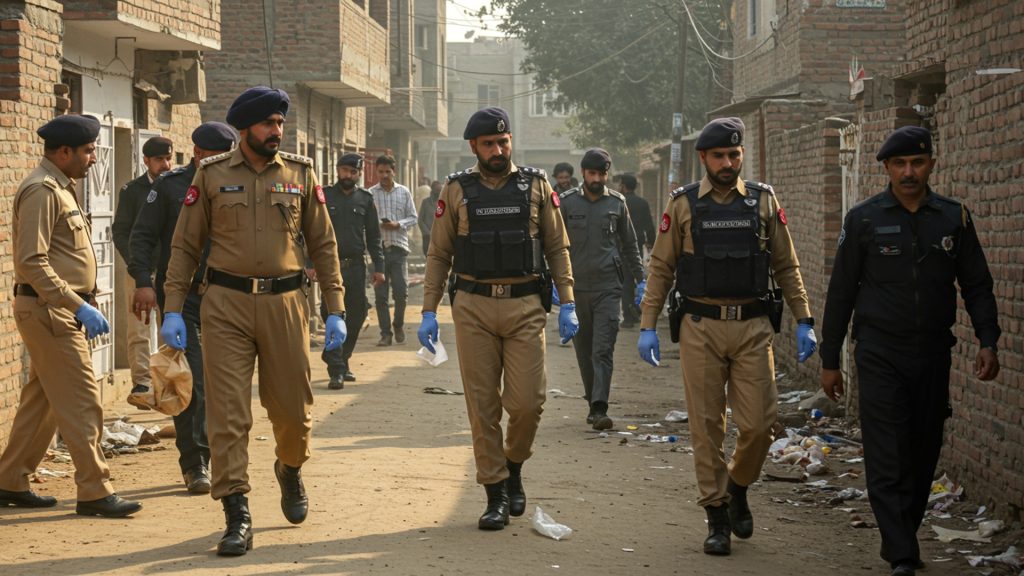Punjab Police ramps up its war on drugs with massive, widespread raids happening right now across the state. This urgent and forceful action aims to break the networks of drug dealers and stop the flow of illegal substances that harm communities. Police teams are moving quickly, searching many places and arresting people linked to drug crimes, showing a strong push to make Punjab free from drugs. This intensified effort reflects the ongoing struggle to protect our people from this danger, bringing new focus to the battle against drug abuse.
How Punjab is Fighting the Drug Problem
The Punjab Police, in close coordination with the state government, has greatly stepped up its efforts in the “Yudh Nashian Virudh” (War Against Drugs) campaign. This ongoing fight aims to free Punjab from the widespread problem of drug abuse that has troubled the state for many years. The campaign, which started on March 1, 2025, follows a clear three-part plan: stopping the supply of drugs through strong police action, helping people addicted to drugs get treatment. teaching everyone, especially young people, about the dangers of drugs to prevent them from starting.
The state’s fight against drugs is a continuous process, with police teams conducting raids across all 28 police districts. The Chief Minister, Bhagwant Singh Mann, has given clear instructions to police heads and district officers to make Punjab a drug-free state. To keep a close watch on this war, the Punjab government has also set up a special committee of five cabinet ministers, led by Finance Minister Harpal Singh Cheema.
The problem of drugs in Punjab is deep-rooted. The state’s location near the “Golden Crescent” (Afghanistan, Pakistan. Iran), a major source of illegal drugs, has made it a route for drug movement. In the past, the ease of getting money due to agricultural success. issues like unemployment, have also played a part in young people turning to drugs. Some reports even state that in certain border areas, as many as 75 percent of young people aged 15-25 were using heroin. 67 percent of homes in villages might have at least one person addicted to drugs. This background makes the current intensified police efforts even more crucial.
Major Raids and Arrests
The Punjab Police has been carrying out large-scale search operations and raids daily, showing a strong commitment to catching drug dealers and breaking their networks. These operations involve hundreds of police teams and thousands of police officers. For example, on August 17, 2025, as part of the 169th day of the campaign, police conducted raids at 286 locations across the state. This single day’s effort led to the arrest of 57 drug smugglers and the filing of 42 police reports.
Just one day before, on August 16, 2025, police raided 301 places, arresting 38 drug smugglers and filing 28 police reports. Such consistent and widespread actions are a key part of the police strategy to disrupt the supply of drugs.
Special Director General of Police (Law and Order) Arpit Shukla stated that over 120 police teams, with more than 1,000 personnel and overseen by 59 senior officers, took part in the August 17 raids. They also questioned 335 suspicious people during the day.
Since the campaign began on March 1, 2025, the results have been significant. As of August 17, 2025, the total number of drug smugglers arrested has reached 26,023. By August 13, 2025, the police had filed 16,400 police reports and arrested 25,646 people in drug-related cases. Earlier data from August 5, 2025, showed 15,671 police reports filed and 24,639 smugglers arrested since March 1. These numbers show the large scale of the police action against drug crime.
The Director General of Police (DGP), Gaurav Yadav, has noted that this strong police action has affected the drug market. insights from police sources and informal checks show that the street prices for heroin have gone up by 50 percent. prices for synthetic drugs have increased by 40 percent. This points to the police efforts are making it harder for drugs to be supplied.
What Police Have Found
The raids have led to the recovery of large amounts of various illegal substances and money. The types of drugs seized include heroin, poppy husk, opium, charas, ganja. a significant number of intoxicating tablets and capsules. Police have also found large sums of cash, which is believed to be drug money.
| Item Seized (Since March 1, 2025) | Amount | Source Dates |
|---|---|---|
| Heroin | Over 1,059 kg | Aug 5, Aug 13, July 29 |
| Opium | Over 330 kg | Aug 5, Aug 13 |
| Poppy Husk | Over 215 quintals (21,500 kg) | Aug 5, Aug 13 |
| Intoxicant Pills/Tablets | Over 31. 7 lakh | Aug 5, Aug 13 |
| Drug Money Recovered | Over Rs 12. 32 crore | Aug 5, Aug 13 |
In recent daily operations, the amounts seized continue to add up. For instance, on August 17, 2025, police recovered 461 grams of heroin, 415 intoxicating tablets/capsules. Rs 31,550 in cash. On August 16, 2025, they seized 620 grams of heroin and 1,612 intoxicating tablets or capsules.
Beyond traditional drugs, there has been a noticeable increase in the smuggling of pharmaceutical drugs. In Ludhiana, for example, seizures of intoxicating pills and capsules tripled between March 1 and July 31, 2025, compared to the same period last year. These drugs are often smuggled from nearby states like Himachal Pradesh. Police are also taking action against properties linked to drug trafficking, with some being frozen or torn down to hurt the financial power of drug dealers.
Beyond Enforcement: Help and Education
The “War Against Drugs” in Punjab is not just about police raids and arrests; it also includes strong efforts in de-addiction and prevention. The state government sees drug users as patients who need help, not just as criminals.
As part of the de-addiction strategy, police and government officials are working to convince people struggling with addiction to seek treatment and rehabilitation. On August 17, 2025, for instance, 45 people were persuaded to go for de-addiction and rehabilitation treatment. On August 16, 33 people were convinced to undergo treatment. This compassionate approach aims to bring drug users back into normal life.
A new program called ‘Each One Adopt One’ has been started by DGP Gaurav Yadav, where every police officer, from the highest rank downwards, will adopt one drug user. The officer will help that person through their treatment and recovery process. This personal involvement aims to give more support to those trying to quit drugs.
For prevention, the Punjab government has introduced an anti-drug school curriculum for students in classes 9 to 12. This curriculum, which began on August 1, 2025, aims to educate about 8 lakh students. It involves regular sessions with documentaries, quizzes. interactive activities to teach students how to say no to drugs and resist peer pressure. Over 6,500 teachers have received special training to teach this new course.
The government is also working with local communities, including village councils and elders, to gather data and track the activities of repeat offenders who have been released on bail. This community involvement is seen as crucial for long-term success. The Chief Minister has also started a reward policy for police officers who perform well in the anti-drug campaign, giving Rs 1. 20 lakh to officers who recover more than one kilogram of heroin.
Why This Fight Continues
Despite the significant successes and continuous efforts, officials acknowledge that the fight against drugs is not over. DGP Gaurav Yadav has stated that while great progress has been made in reducing drug availability, there are still areas where drugs can be found. He described the drug issue as “cyclical” but stressed that availability has been greatly reduced.
The government’s resolve remains strong, with a clear focus on continuing enforcement, de-addiction. prevention. The aim is to completely remove drugs from Punjab. The police continue to monitor individuals released on bail, especially those who have offended multiple times.
The Punjab government has also addressed concerns about the role of the Border Security Force (BSF) and the central government in stopping cross-border drug smuggling, highlighting the need for combined efforts. The focus remains on making Punjab a state where young people have opportunities and a future free from the grip of drugs. The ongoing actions reflect a broad and determined approach to a complex problem that has affected many lives in the state.

